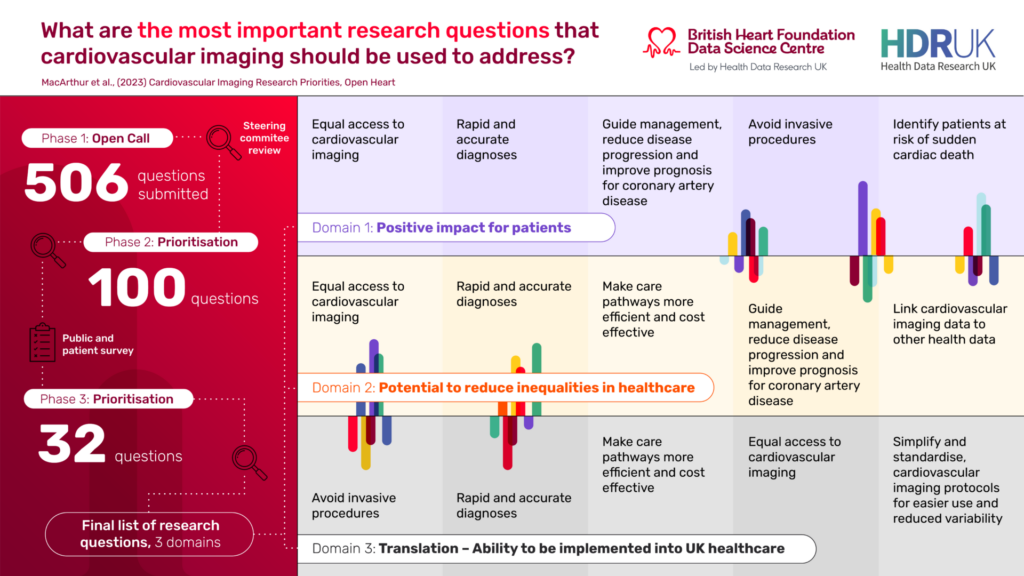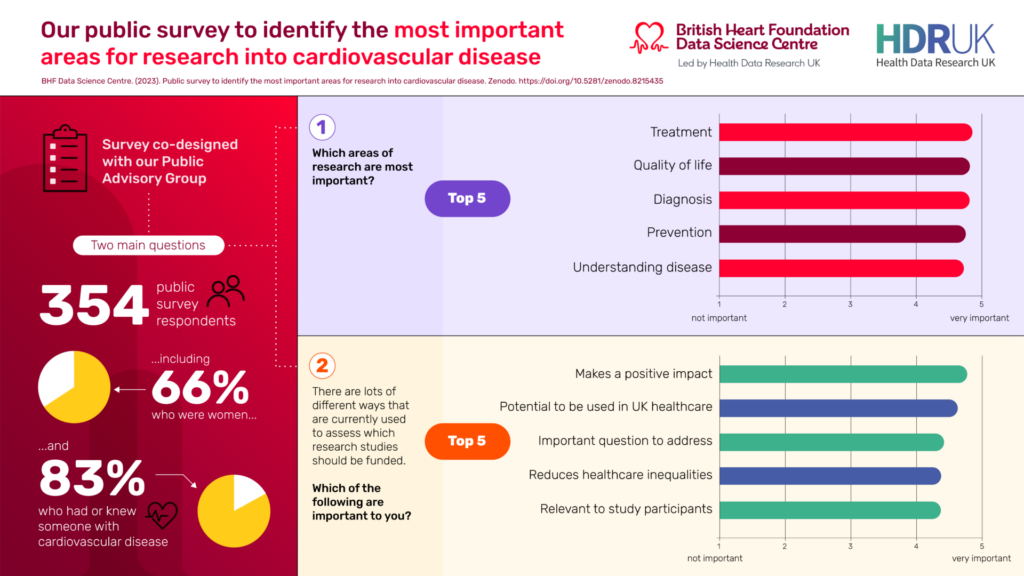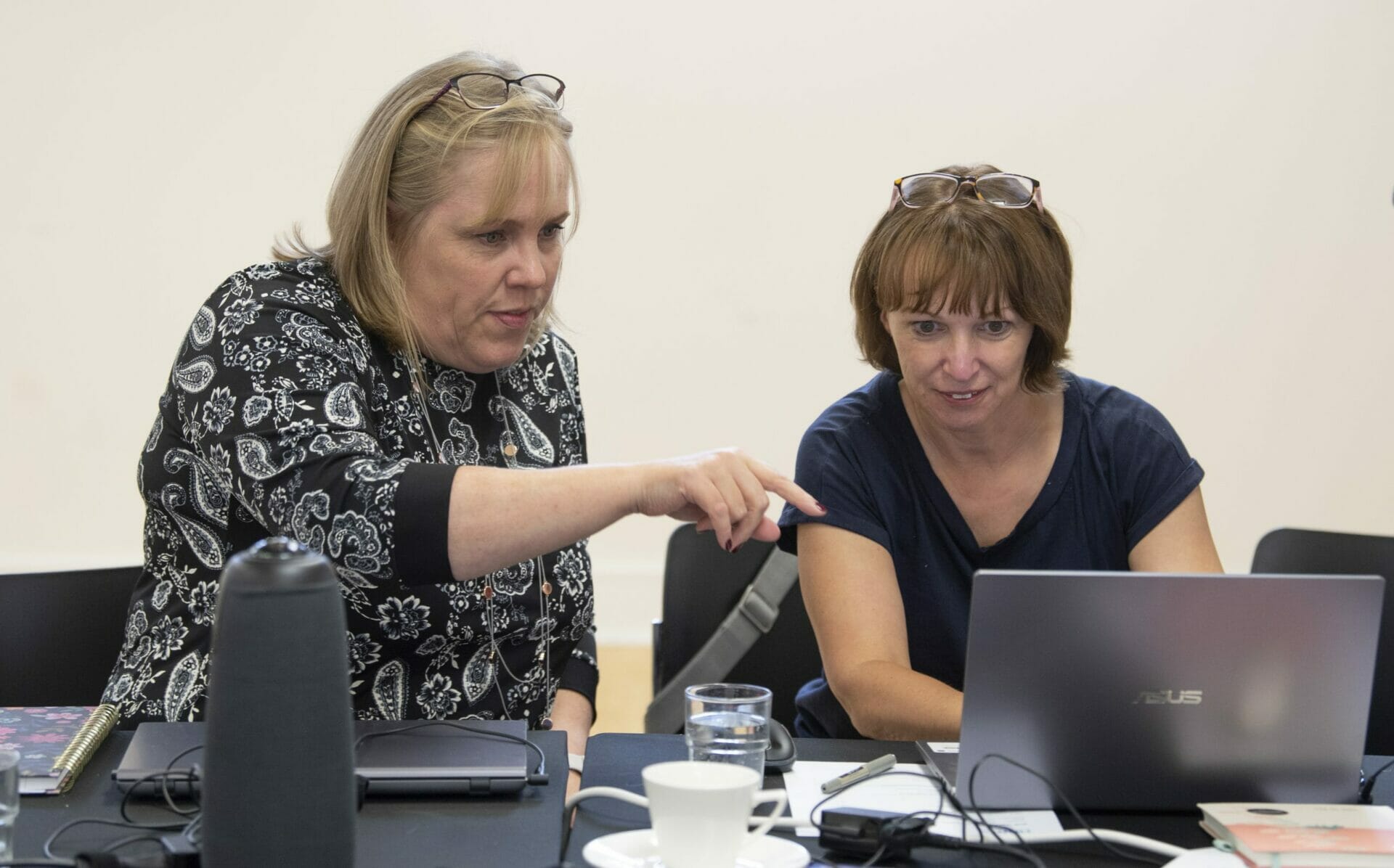Theme Lead: Professor Michelle Williams
Cardiovascular imaging provides detailed insights into heart and circulatory diseases, but unlocking its full potential requires linking imaging data with other healthcare datasets and applying advanced AI and machine learning techniques. These approaches present technical, governance, and analytical challenges. We’re addressing these challenges by improving imaging data accessibility, supporting research, and developing new methodologies to drive impactful discoveries.
What we do
We work with researchers, clinicians, data custodians, and patient representatives to:
- Improve access to imaging datasets for cardiovascular research
- Develop tools to enhance the usability and quality of imaging data
- Explore new approaches, such as synthetic data and federated analysis, to enable large scale research
- Ensure research aligns with public priorities through patient and public involvement
Key areas of work
Establishing Cardiovascular Imaging Research Priorities
We collaborated with over 80 experts to identify and prioritise 500 key research questions in cardiovascular imaging. Using a structured framework, we distilled these into a Top 10 list, focusing on patient impact, feasibility, and potential to reduce healthcare inequalities.
Read the full workshop report.
View the research priorities publication.

Engaging Patients and the Public
To support us with setting research priorities, we co-designed a public survey to align research with patient needs and priorities. The findings will continue to guide our work, ensuring imaging research delivers the greatest public benefit.

Read the survey report.
Watch our PPIE webinar.
SHIELD-CVD
Find out more about the ScottisH medical Imaging dataset with Evaluation of Linked Data for CardioVascular Disease (SHIELD-CVD) project.
Scaling Up Imaging Research using Advanced Methods
We are exploring two key approaches to enable secure, large-scale research:
- Synthetic Data – Running an open challenge to develop AI models using synthetic ECG images, with the winning entry showcased at the European Society of Cardiology Conference 2025.
- Federated Analysis – Conducting a national survey to assess researcher needs and opportunities for federated data analysis.
Driving Policy and Implementation
Professor Michelle Williams contributed to British Standard BS 30440, a framework guiding the validation and deployment of AI tools in NHS healthcare. This ensures that AI-driven imaging research translates into real-world patient benefits.
Areas of work
Find out more about our data-led research.

Whole Population Data
We aim to improve access to and use of high-quality, linked health datasets covering entire populations across the UK.

Defining Disease
To drive large-scale, data-driven research, we’re working to develop and share reusable definitions of cardiovascular diseases in computable forms. These definitions enable researchers to interpret and use health data, leading to more accurate and reproducible studies.

Enhancing Cohorts
We’re working to accelerate health data research by making it easier, faster, and more secure to link data from clinical cohorts with routine health records. This approach will help researchers uncover new insights into disease causes, progression, and treatment, improving patient care and outcomes.

Data Enabled Clinical Trials
By integrating routinely collected NHS health data into clinical trials, we’re helping researchers recruit participants more effectively, reduce administrative burdens, and generate real-world evidence that can lead to quicker, more impactful advances in cardiovascular care.

Smartphones and Wearables
We’re working to unlock the potential of smartphone and wearable data to discover new ways to prevent, diagnose, and treat cardiovascular disease, by establishing secure access to and fair use of smartphone and wearable data linked to healthcare records.

CVD-COVID-UK / COVID-IMPACT
CVD-COVID-UK/COVID-IMPACT is a major research programme coordinated by the BHF Data Science Centre, bringing together a consortium of over 400 researchers across more than 50 organisations. The programme enables analysis of anonymised, linked, nationally collated healthcare datasets across the UK to investigate the relationship between COVID-19 and cardiovascular disease, as well as its impact on other health conditions and risk factors.

Diabetes Data Science Catalyst
This exciting partnership between the BHF Data Science Centre, Diabetes UK and HDR UK aims to develop improvements in our understanding of the link between cardiovascular diseases and diabetes.

Stroke Data Science Catalyst
A partnership between the BHF Data Science Centre, the Stroke Association, and HDR UK, using data to drive research into stroke prevention, treatments, and care.

Kidney Data Science Catalyst
This partnership between the BHF Data Science Centre, Kidney Research UK and HDR UK will enable researchers to securely access, link and analyse existing UK health data, speeding up the search for better kidney and cardiovascular disease prevention, treatments, and care.